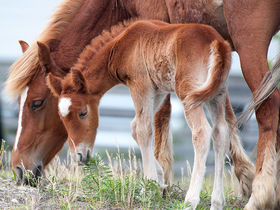No matter the season, the wild mustangs of Corolla are one of the biggest, if not the top, attractions in Currituck County. At the height of the season, visitors on chartered horse-sighting tours roll past the dunes hoping for a glimpse of these majestic beauties. We have many reasons to count the wild horses among the best qualities of the Currituck Outer Banks, but if we had to pick one thing we’d say we love them because we can enjoy them all year long.
 Some businesses close after peak season, some stay open, and the horses continue playing in the surf and sand – they don’t take holidays off! If you’ve seen the gorgeous photography on our Facebook page and Instagram you’ll know, and we do appreciate all the kind words left in the comments.
Some businesses close after peak season, some stay open, and the horses continue playing in the surf and sand – they don’t take holidays off! If you’ve seen the gorgeous photography on our Facebook page and Instagram you’ll know, and we do appreciate all the kind words left in the comments.
Occasionally, too, we’ll see some concern for our equine friends, particularly when inclement weather hits our area. What happens to the horses during a hurricane? How do they survive in the snow? Some have asked if the horses are corralled and moved to a safe place until the skies clear. This is a definite no.
Laws are in place to protect the wild horses – people cannot come within 50 feet of any Mustang in the area. We appreciate how people care for the welfare of these beautiful creatures, and when asked about their safety in the wake of a storm or snowfall our answer is the same: the horses know exactly where to go and what to do. The approximately 100 horses residing in Currituck County are descended from the first Spanish Mustangs to arrive in this country nearly 600 years ago, and we hope to have them around for years to come.
When the temperature drops in Currituck – typically it’s between the mid 30s and high 50s here in winter – the horses adapt naturally to the changes. They shed their smooth summer coats and grow heavier, shaggier layers for protection against wind and cold. According to the Corolla Wild Horse Fund, a nonprofit dedicated to the preservation of land designated as the horses’ sanctuary, the horses will also eat more in winter because the continued digestion helps warm them from inside. Our wild Mustangs forage for sea oats year round; it’s the staple of their diet, therefore it’s important for visitors staying in the 4×4 area to not leave food out for them to find. A horse could suffer illness or worse if given any food, even apples, meant for humans.
While we enjoy pleasant weather for much of the year, on occasion we do find ourselves in the path of a hurricane or heavy rain. When it happens, the horses act on instinct and seek out the safer spots within the sanctuary area until the worst of the weather subsides. The sound-to-sea fence separating the sanctuary from the more populated parts of Corolla prevents the horses from coming onto Highway 12 and risking injury from vehicular traffic.
If you’re able to stay in Currituck before the season begins, you will have the opportunity to see for yourself how our horses are faring. If you rent a vacation home in the 4×4 beach area, don’t be surprised if you spot one or two in the yard one morning! Enjoy the view, take all the pictures and video, but don’t interfere.
